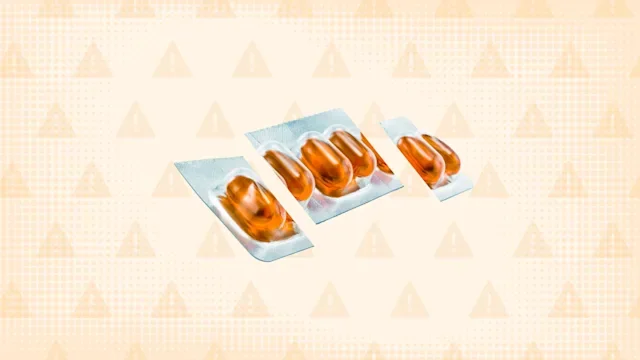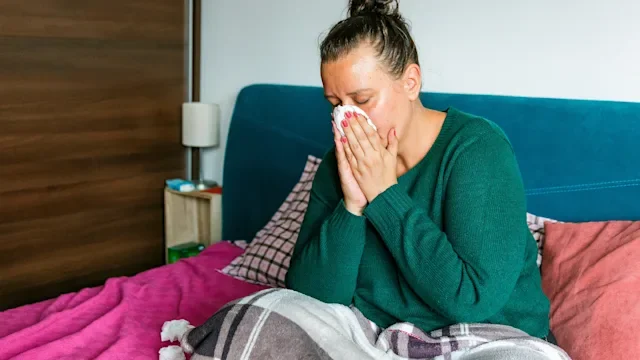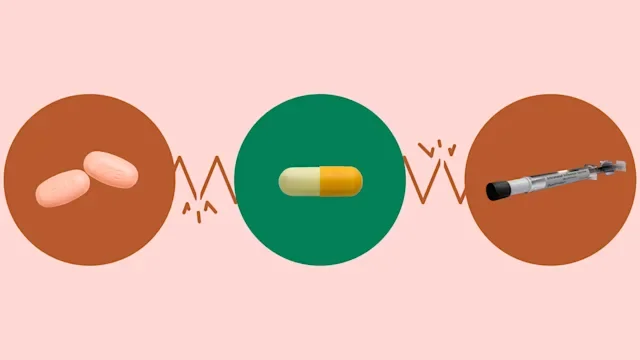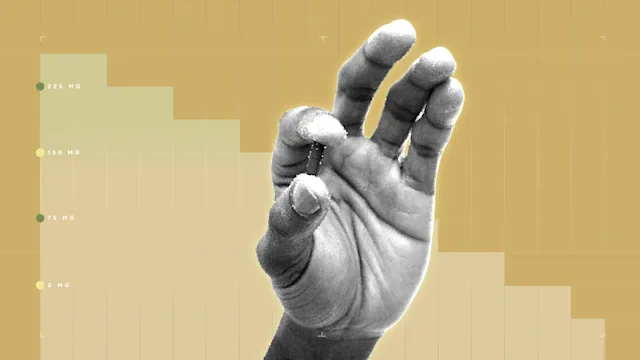Key takeaways:
Flu symptoms in babies are often different from those in adults.
Babies who get sick with the flu can develop fever, poor feeding, sleepiness, or trouble breathing.
Infants can take Tamiflu (oseltamivir) if they’re sick with the flu. Tamiflu can help them feel better faster. But the medication works best if started within 48 hours.
Save on related medications
Infants are vulnerable to the flu (influenza) — especially those who are too young to be vaccinated. Every year, about 1 in 4 pediatric deaths from the flu are in children younger than 23 months.
If you have an infant, it’s important to know how the flu can affect them. Babies often don’t show typical signs of the flu, and they can’t use words to tell you how they’re feeling. But we’ve got you covered with what to look for to keep your baby safe and what to do if you think your baby has the flu.
How to recognize flu symptoms in babies
Flu in babies is different from flu in adults — or even flu in toddlers and children. Your baby may have more subtle symptoms at first, which can make it tricky to know how they’re doing. Plus they can’t tell you that they’re sick or achy. But there are signs to watch for.
Search and compare options
Flu symptoms in babies can include:
Poor feeding: Your baby may eat less when they start to feel sick. Or they may have trouble eating if they can’t breathe easily. During flu season, you’ll want to pay close attention to how well your baby is nursing or drinking their bottles. Poor feeding might be your first clue that they’re getting sick.
Fussiness: Your baby may be fussier than normal when they have the flu. And many babies sleep more when they’re not feeling well.
Vomiting or diarrhea: Unlike adults, children and babies can have vomiting or diarrhea when they’re sick with the flu. This puts them at risk for dehydration. Dehydration can happen quickly in babies. See their pediatrician if your baby isn’t making as many wet diapers as usual, or their diapers seem less full. These are signs of dehydration.
Cough and nasal congestion: Like adults, babies and newborns with the flu can have cough and nasal congestion.
Fever: High fever is another common symptom of flu in babies.

How long does the flu last in infants?
Most flu symptoms in babies go away after 7 to 10 days. Newborn or infant flu symptoms may get worse over the first 72 hours of their flu illness. Babies usually start to feel better over the next 2 to 3 days. Some babies get better quickly while others take a few days to get back to their usual level of activity.
Which flu treatments are helpful for babies?
When your baby gets the flu, you’ll want to stay in close touch with their pediatrician. They may recommend flu treatments, such as:
Antiviral medication: Oseltamivir (Tamiflu) is a prescription antiviral medication that can help treat the flu in babies. Infants as young as 2 weeks may be prescribed Tamiflu. But Tamiflu works best when it’s taken within 48 hours of symptoms starting, so you’ll want to connect with your care team as soon as possible if your baby shows signs of the flu.
Hydration: Make sure to keep your baby well hydrated with breast milk or formula. Although it may be tempting, babies under 6 months old shouldn’t drink water. To know if your baby is staying hydrated, make sure they have several wet diapers every day.
Cool mist: If your baby has a stuffy nose, cool mist (from a cool mist humidifier) can help melt the mucus in their nose.
Nasal saline and suctioning: You can also use nasal saline (saltwater) drops and gentle suctioning to relieve nasal congestion.
Keep in mind that some common flu treatments for adults may not be appropriate for babies. For example, over-the-counter (OTC) cold medicines — like those that treat cough, congestion, or pain — shouldn’t be given to babies unless a healthcare professional specifically recommends them.
Vaccinations for babies: Babies 6 months and older can get the flu vaccine. Here’s how to plan for your child’s vaccine visits.
How to tell if your baby has colic: Many babies have colic, and it can be quite distressing for all involved. Here’s what to do.
Can babies drink water? If your baby gets the flu, it’s important to keep them hydrated. But babies under 6 months should avoid water and stick to breast milk or formula.
And although acetaminophen (Tylenol) is generally safe, it can hide a fever, which makes it hard to know how sick your baby is. Never give any OTC medicine to an infant younger than 3 months without talking with a healthcare professional first.
When to call a healthcare professional
Any baby younger than 3 months who gets a fever should get medical attention right away. A fever is a rectal temperature of 100.4°F (38°C) or higher. These babies might seem OK, but their illness can become severe quickly.
All babies younger than 2 years are at high risk for developing serious illness if they get the flu. This is especially true if they haven’t had both doses of the flu vaccine. If your infant has had both doses of the flu vaccine, they’re much less likely to have severe symptoms. But they’re still at high risk. Because of the risk babies face when they get the flu, always tell your pediatrician if you think your baby might have the flu.
If your baby has been diagnosed with the flu, call your pediatrician right away if your baby is:
Not eating well and you’re worried about dehydration
Not making several wet diapers a day
Fussy and difficult to calm
Sleepy and difficult to wake up
Breathing fast or seems to have trouble breathing
When should you take your infant to the hospital?
There are times when babies need medical attention right away. During office hours, it can help to call your child’s pediatrician first. But if you can’t get in touch with anyone, or if you’re still concerned, take your baby to the hospital.
Your infant needs medical attention quickly if they:
Have trouble breathing
Are very sleepy or difficult to wake up
Are unable to eat
Haven’t had wet a diaper for over 6 hours
Are younger than 3 months and have a temperature of 100.4°F (38°C) or higher
Difficulty breathing is the most important reason to get your baby to the hospital right away. Signs of trouble can include fast or noisy breathing and breathing that interferes with eating or crying. When babies have trouble breathing, they might use their stomach and chest muscles or flare their nostrils.
Call 911 if your baby looks blue or won’t wake up.
How to keep your infant from getting the flu
If your baby is 6 months or older during flu season, they should get a flu vaccine. The flu vaccine is safe and effective in babies. The first time your baby gets a flu shot, they’ll need 2 doses, 1 month apart.
Babies younger than 6 months are too young to get a flu shot. If your infant is too young to be vaccinated, here are some other things you can do to help protect them from the flu:
Make sure everyone else in your home — and all of their caregivers outside the home — has been vaccinated against the flu. This builds a layer of protection around your baby.
Keep your baby away from people who are sick. Some people get mild symptoms with the flu, but the germ is the same. Anyone who thinks they might be sick should stay away from your baby until they feel better.
Wash your hands every time you cough, sneeze, or eat. And take special care to wash your hands before you touch your baby.
How to protect your baby if you have the flu
If you or people who live with you get the flu, it’s important to protect your baby and watch them closely for flu symptoms. This can be especially stressful if you’re the primary caregiver. For many people, it’s just not possible to stay away even when sick. But there are still steps you can take to keep your baby safe.
Here’s how you can lower the chance of your baby getting sick when you have the flu:
Wear a mask when you’re around your baby.
Wash your hands often, especially before touching or feeding your baby.
Clean and disinfect frequently touched surfaces.
Clean and disinfect bottles, nipples, and pacifiers before you use them.
If you or someone else in your household has the flu, your pediatrician may recommend preventive treatment with oseltamivir (Tamiflu) for your baby if they’re 3 months or older.
It’s especially important to talk with your baby’s pediatrician if you’re diagnosed with the flu and your baby is younger than 3 months, was born prematurely, or has other medical conditions. They can give you specific instructions on what to do.
How to keep your infant from spreading the flu
The best way to keep your baby from spreading the flu to others is to get them vaccinated against the flu each season.
If your baby does get the flu, here’s how you can reduce the chance of passing it to others:
Keep your child out of day care until they don’t have a fever for 24 hours without the help of acetaminophen.
Wash your hands before and after touching or feeding your baby.
Clean and disinfect anything that goes in your baby’s mouth. This includes cups, utensils, pacifiers, nipples, and toys.
Encourage other children and adults in your home to wash their hands.
Should your child get a flu vaccine every year?
Yes. The CDC and the American Academy of Pediatrics recommend that all children older than 6 months get vaccinated against the flu each year.
Your baby needs a yearly flu shot because the flu virus changes from year to year. That means the immune system can’t respond quickly enough without the help of vaccines for babies.
The flu shot isn’t 100% effective. But studies show that children who are vaccinated against the flu and then get sick are less likely to develop serious illness.
Your child can get their flu shot at the same time as their usual childhood vaccines. They can also get a flu shot at the same time as a COVID vaccine. With a busy schedule, it can be tough to find a time for a vaccine appointment. So many wonder if their child can get the flu shot if they have a cold or mild illness. In most cases this is OK. But if you aren’t sure how sick they are, it’s best to check with their pediatrician.
The bottom line
The flu can be scary, especially when a newborn or baby gets sick. Unfortunately, the best protection against the flu — getting a flu shot — isn’t an option for babies younger than 6 months.
Babies and newborns with the flu can develop fever, cough, and congestion. But they may also develop unique symptoms like sleepiness, fussiness, trouble feeding, vomiting, and diarrhea. Babies who are sick with the flu can get sick quickly, so connect with your child’s pediatrician as soon as possible if you think your baby might have the flu.

Why trust our experts?



References
Bryant, K. (2023). Which flu vaccine should children get? HealthyChildren.org.
Centers for Disease Control and Prevention. (n.d.). Influenza-associated pediatric mortality.
Centers for Disease Control and Prevention. (2024). Flu and children.
Centers for Disease Control and Prevention. (2024). Key facts about seasonal flu vaccine.
Committee on Infectious Diseases. (2023). Recommendations for prevention and control of influenza in children, 2023–2024. Pediatrics.
Hashikawa, A. N. (2023). Simple steps to help children in child care stay safe & healthy during flu season. HealthyChildren.org.
HealthyChildren.org. (2021). Fever and your baby.
Izraelit, A., et al. (2010). Neonatal cyanosis: Diagnostic and management challenges. ISRN Pediatrics.
MedlinePlus. (2023). Your baby and the flu.
Nemours KidsHealth. (2023). All about the flu (influenza).
Nemours KidsHealth. (2024). Your child's vaccines: Influenza (flu) vaccine.
Uyeki, T. M. (2020). High-risk groups for influenza complications. JAMA.













